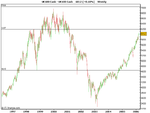Interesting extract from Nils Pratley in todays Guardian
The FTSE 100 spent much of yesterday above 6,000 points for the first time since March 8 2001. It didn't quite last, the closing level was 5,999.4. But if you bought the index on March 12 2003 you would now be enjoying an 82% return. On that day one person advised investors to ignore the general panic. Alastair Ross Goobey, who led the giant Hermes pension fund for years, told a sceptical world it was the best opportunity for buying shares for a generation. Stock market calls do not come much better than that.
So what does Ross Goobey make of 6,000? "I don't think you can say it's overstretched, but it's not cheap.The great change would happen if [companies'] profitability started to fall, if economies started to slow down in 2006 & 2007."
There's the rub. Right now, the western business world seems awash with cash, and the roots can be traced directly to the explosion of the dotcom bubble. Appetites for risk diminished, which for many companies meant reducing capital expenditure. We're preparing for tough times, they said. The lean years never really arrived. Western consumers continued to fly, shop and upgrade their mobile phones. The housing market did not collapse and banks did not stumble under the weight of bad loans. The result, for many companies, has been record profit margins. It happened because central bankers provided us with cheap money and cheap mortgages. What changes when that tap is turned off - especially in America, where the national debt is growing at $2bn a day - has yet to be seen. Conventional wisdom says profits and returns should revert to their long-term averages.
But perhaps not just yet. Cash is a potent fuel for any stock market. When it arrives in the form of takeover bids, it rarely pays to underestimate the speed at which prices move. Fifteen months ago, the LSE was braced for a bid from Deutsche Börse at 530p a share; last week it rejected a 950p offer from Nasdaq and could now face a fresh assault at up to £15. Similar stories have been seen across the market. As long as the bids keep coming, many investors will worry about missing out. We're still almost 1,000 points below the all-time high and the journey from 5,000 to 6,000 took little more than 12 months. History suggests it will take a little longer to achieve the high-water mark of the dotcom era.
Stock market historian David Schwartz argues that any bull run of 36 months is due a correction. True, 1991-1997 was a recent counter-example, but you have to go back to the 1950s to find others. "When everybody is euphoric it's usually a sign that the market is about to run out of steam," Schwartz says. He is not in the business of identifying causes, but there are plenty to choose from - such as the threat of civil war in Iraq, Iran's nuclear ambition, a weakening dollar or a crisis in those emerging markets whose gains have made the Footsie's look modest. But that's the fascination and frustration of stock markets - if the prediction game was easy, we'd all be rich

